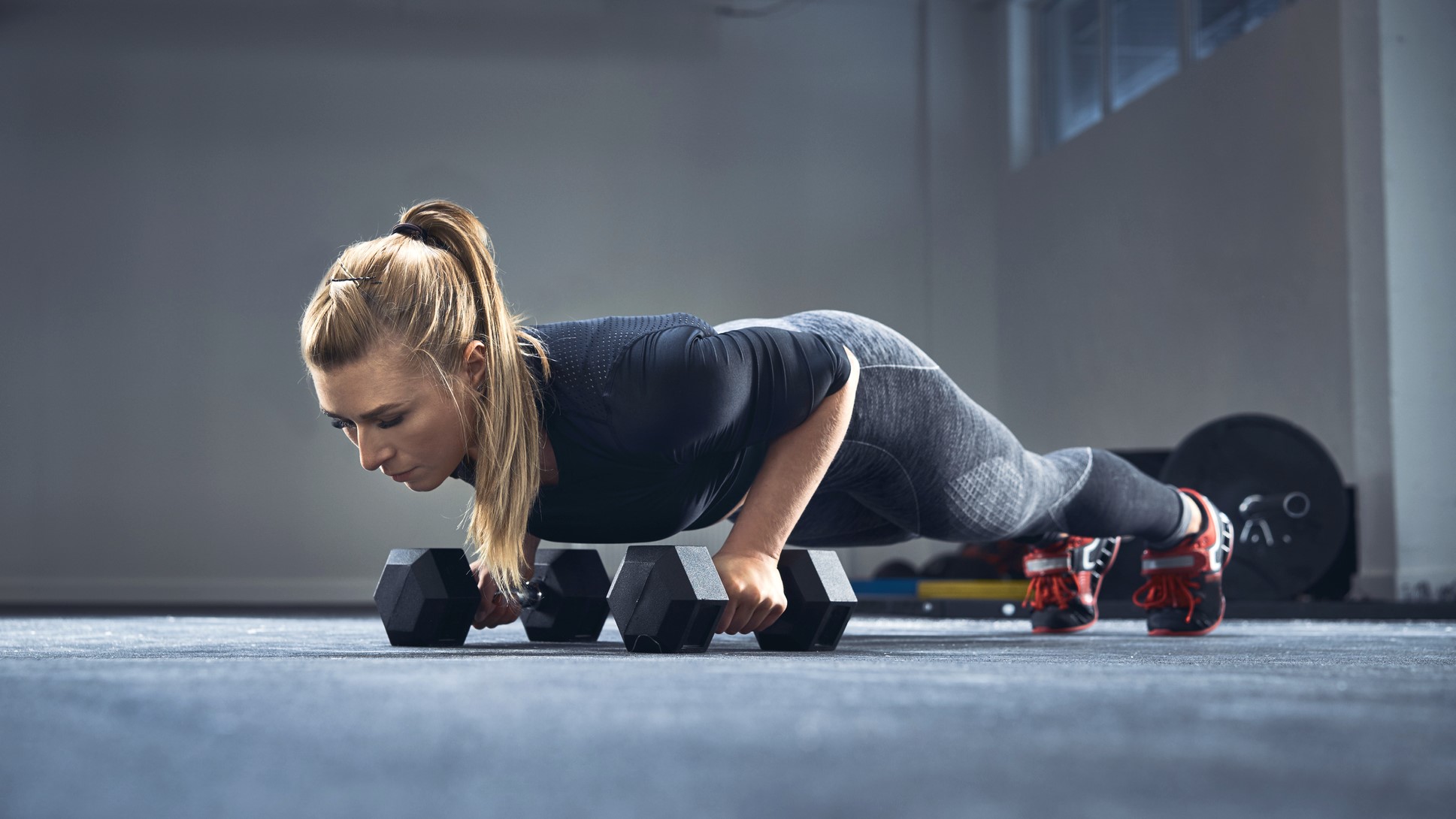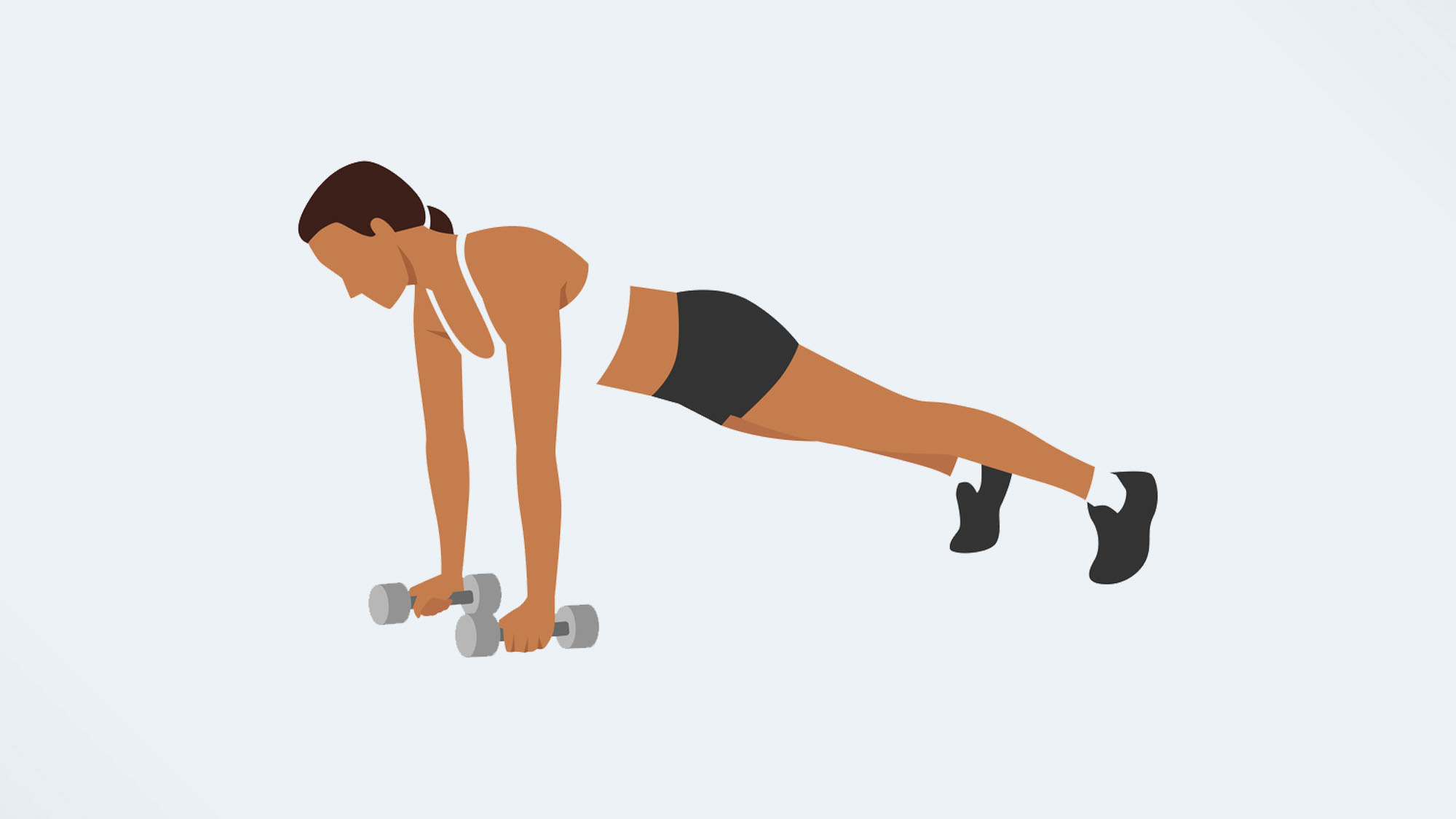
The push-up is probably the most common and best-known strengthening exercise of them all. Think about it: If someone said to you “Drop and give me 20,” you’d know exactly what they meant, even if they didn’t look and sound like a drill sergeant and wore a hat with an implausibly wide brim. The move is a workout staple for good reasons — it’s a fantastic upper-body exercise, it can be done almost anywhere, and it’s even a reliable indicator of cardiovascular health. It’s also amazingly adaptable, which brings us neatly to the dumbbell push-up.
What is it?
Let’s start with the basics: The push-up is a compound exercise that works the pecs, the triceps, the deltoids, and, done properly, the core. Doing the move with a pair of dumbbells increases the range of motion — you get a deeper push-up, as you begin from a higher position. You could also do this variation with a pair of yoga blocks or, indeed, anything that raises you higher off the floor. However, most people who try it will use dumbbells, if only because they are more likely to have them and because this variation can itself easily be adapted with the addition of a row — balancing on one arm and raising the other to the side of the chest when in the high-plank position.
How to do a dumbbell push-up
Everyone thinks they know how to do a good push-up, and, yes, it’s not a complicated move, but the better your form, the more you’ll get from it. Adding the dumbbells alters your hand position, but things stay the same otherwise. Here’s the best adjustable dumbbells to buy if you’re still working out from home.

- Begin in a standard push-up position, but hold a pair of dumbbells on the floor, with your palms facing each other. You can place the weights in line with your shoulders or, to get a more intense chest workout, further apart. Ideally, use hexagonal dumbbells, as they won’t roll away from you during the move.
- Brace your core and bend your elbows to smoothly lower your body to the floor, maintaining a straight position throughout.
- Push up through the dumbbells to extend your arms until they are straight. You will end up in a high-plank position. That’s one rep. Aim for three sets of 10 to begin with, resting for 30 seconds between each set.
I did the dumbbell push-up for a week — here’s what happened
I’ve been doing push-ups for a very long time and have even tried a couple of variations for Tom’s Guide — the pike push-up and the diamond push-up — but before this challenge, I’d never tried the dumbbell version. Still, I was loudly confident that it wouldn’t pose any problems. Of course, that didn’t stop me from making mistakes.
My dumbbells are not ideal
I started off with three sets of 10 and found them much harder than the standard push-up. There were a few reasons for this: My dumbbells have circular weights and fairly narrow steel handles; plus I did the move on bare floorboards. You can imagine the outcome: I had to work hard to stop the dumbbells from rolling to the left and right, and it wasn’t long before the palms of my hands were imprinted with the crosshatch pattern from the handles.
Sure, I was working my core more than with a normal push-up, but I found it hard to avoid wondering which teeth I’d lose when my face slammed into the floor. I decided to use a mat for the rest of the week, which made things slightly easier, but the pressure on my palms, between thumb and forefinger, remained considerable after only a few reps.
I think this move would be far more comfortable with yoga blocks, or push-up bars, which are often padded. On day five I did the move with two tightly rolled towels in the cardio room of a hotel, and it was far easier.
The wide arm position worked best for me
By placing the dumbbells further apart than shoulder-width, I could far lower more than with a regular push-up. This puts greater emphasis on the chest muscles, if that’s what you’re after. However, don’t feel obliged to drop deeper just because the space is there. Go as low as you comfortably can, so you don’t risk an injury of a face plant. With the weights closer together (which makes the triceps work harder), there was pressure on the inside of my wrist, so I avoided this after day one.
A push-up is a push-up is a push-up
The move really worked my chest and arm muscles, as I knew it would: It’s a push-up, just higher. By the end of the week, I was up to three sets of 20, but the final few were hard: I had to pause in the high-plank position a couple of times. I suspect my struggle with this move had more to do with the hand position and the discomfort than the extra effort of going lower.
I did the dumbbell push-up for a week — here’s my verdict
I felt this one mostly in my chest: my pecs were tender for the first few days, but, as usual, the body did its marvelous thing and just dealt with what was asked of it. There’s no denying it’s an effective move for building muscle. However, the only time when I wasn’t conscious of the pressure on my palms was when I used those rolled-up towels.
This exercise might look impressive, but I could not shake the niggling feeling that dumbbells are used because they are accessible: people are more likely to have them, or to use them in a gym than they are to own a set of push-up bars or yoga blocks. Give it a try, but for the sake of your dignity — and maybe your teeth — use hexagonal weights.







